Leaders and Managers in the Service Sector: Managing Talent Across Different Age Profiles
VerifiedAdded on 2023/01/10
|13
|4080
|76
AI Summary
This report discusses how leaders and managers in the service sector, specifically in the Ritz hotel, London, are responding to managing talent across different age profiles. It explores classical management theories, the roles played by leaders, and different leadership styles. The report also delves into the concept of talent management and its importance in the hospitality industry. It analyzes external and internal factors that influence talent management styles and structures, and suggests strategies for managing talent effectively.
Contribute Materials
Your contribution can guide someone’s learning journey. Share your
documents today.
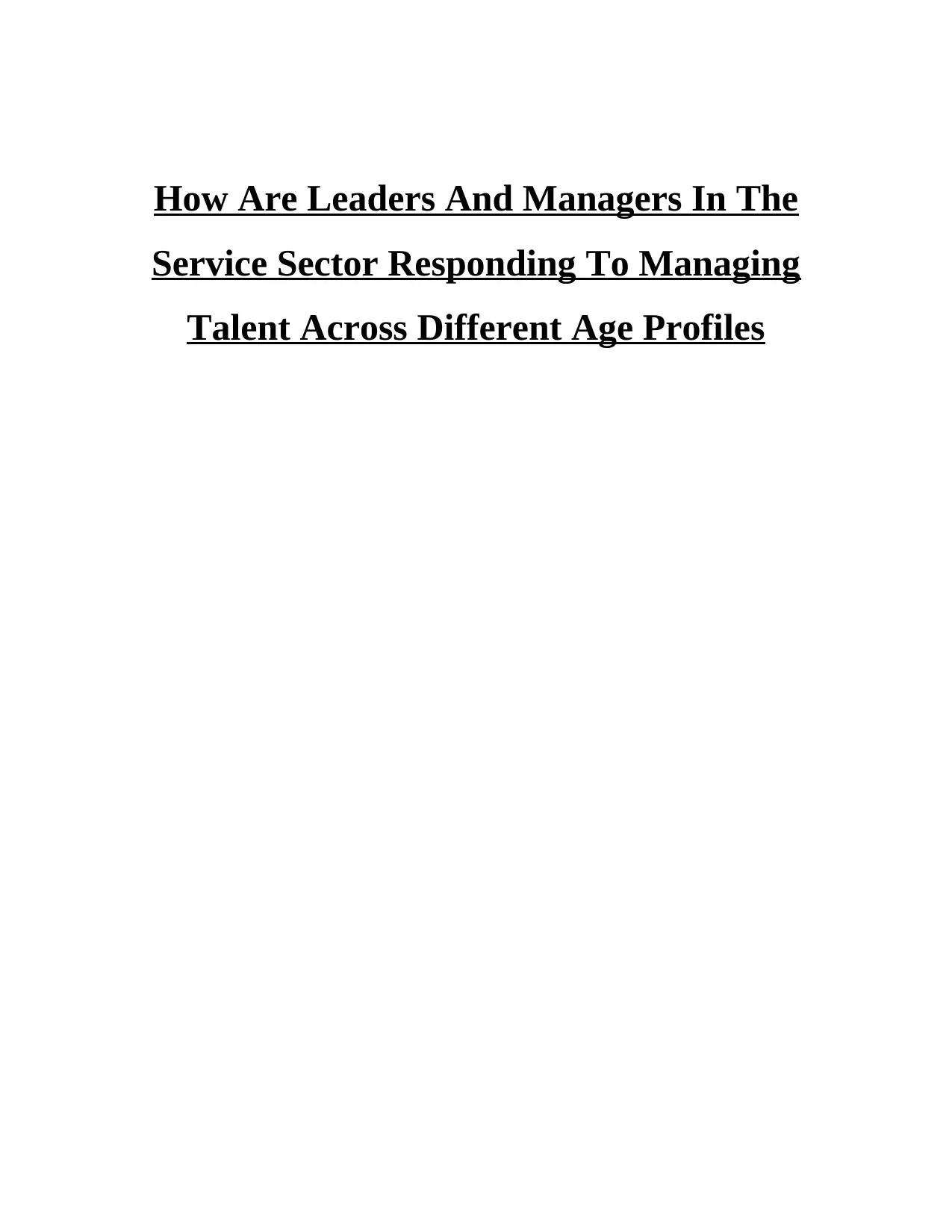
How Are Leaders And Managers In The
Service Sector Responding To Managing
Talent Across Different Age Profiles
Service Sector Responding To Managing
Talent Across Different Age Profiles
Secure Best Marks with AI Grader
Need help grading? Try our AI Grader for instant feedback on your assignments.
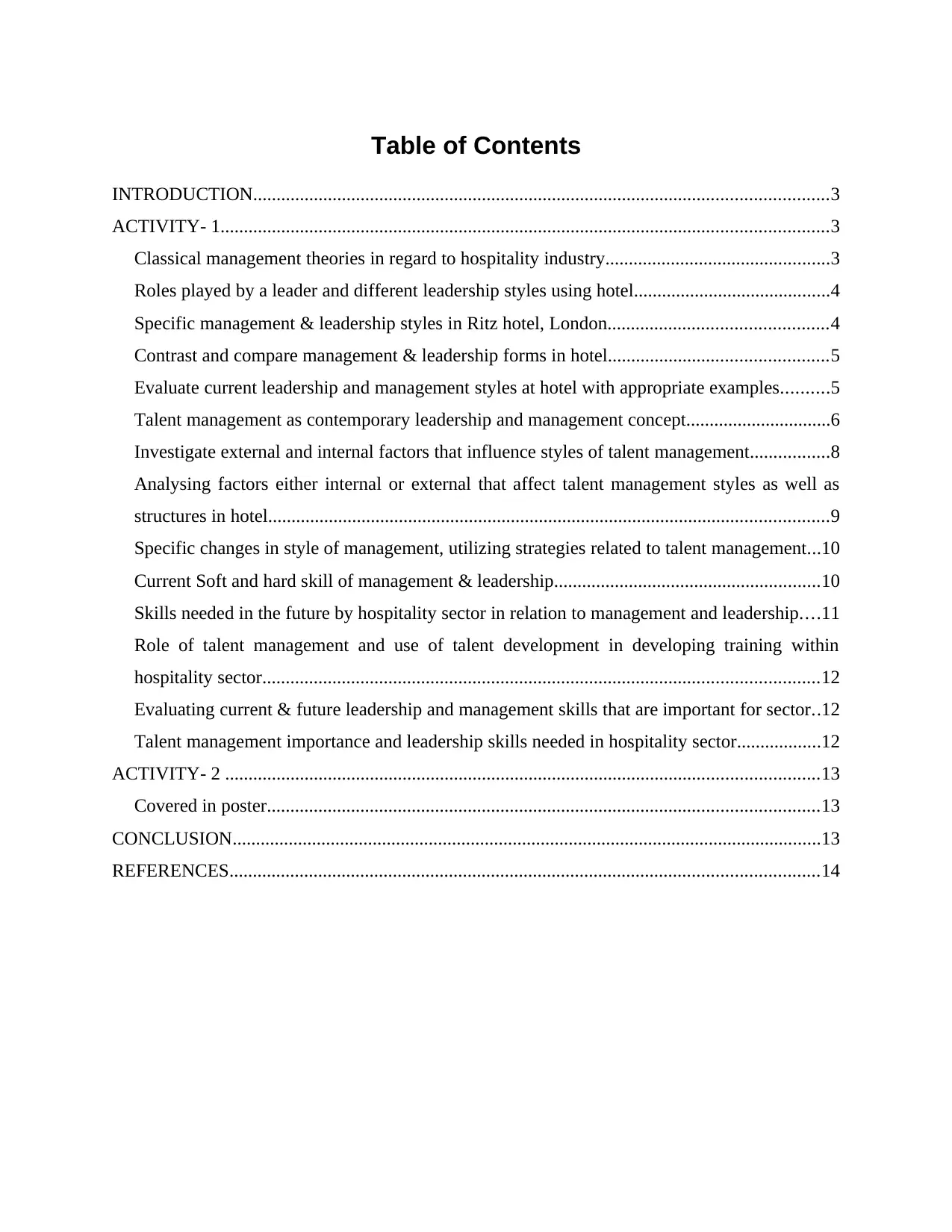
Table of Contents
INTRODUCTION...........................................................................................................................3
ACTIVITY- 1..................................................................................................................................3
Classical management theories in regard to hospitality industry................................................3
Roles played by a leader and different leadership styles using hotel..........................................4
Specific management & leadership styles in Ritz hotel, London...............................................4
Contrast and compare management & leadership forms in hotel...............................................5
Evaluate current leadership and management styles at hotel with appropriate examples..........5
Talent management as contemporary leadership and management concept...............................6
Investigate external and internal factors that influence styles of talent management.................8
Analysing factors either internal or external that affect talent management styles as well as
structures in hotel........................................................................................................................9
Specific changes in style of management, utilizing strategies related to talent management...10
Current Soft and hard skill of management & leadership.........................................................10
Skills needed in the future by hospitality sector in relation to management and leadership....11
Role of talent management and use of talent development in developing training within
hospitality sector.......................................................................................................................12
Evaluating current & future leadership and management skills that are important for sector..12
Talent management importance and leadership skills needed in hospitality sector..................12
ACTIVITY- 2 ...............................................................................................................................13
Covered in poster......................................................................................................................13
CONCLUSION..............................................................................................................................13
REFERENCES..............................................................................................................................14
INTRODUCTION...........................................................................................................................3
ACTIVITY- 1..................................................................................................................................3
Classical management theories in regard to hospitality industry................................................3
Roles played by a leader and different leadership styles using hotel..........................................4
Specific management & leadership styles in Ritz hotel, London...............................................4
Contrast and compare management & leadership forms in hotel...............................................5
Evaluate current leadership and management styles at hotel with appropriate examples..........5
Talent management as contemporary leadership and management concept...............................6
Investigate external and internal factors that influence styles of talent management.................8
Analysing factors either internal or external that affect talent management styles as well as
structures in hotel........................................................................................................................9
Specific changes in style of management, utilizing strategies related to talent management...10
Current Soft and hard skill of management & leadership.........................................................10
Skills needed in the future by hospitality sector in relation to management and leadership....11
Role of talent management and use of talent development in developing training within
hospitality sector.......................................................................................................................12
Evaluating current & future leadership and management skills that are important for sector..12
Talent management importance and leadership skills needed in hospitality sector..................12
ACTIVITY- 2 ...............................................................................................................................13
Covered in poster......................................................................................................................13
CONCLUSION..............................................................................................................................13
REFERENCES..............................................................................................................................14
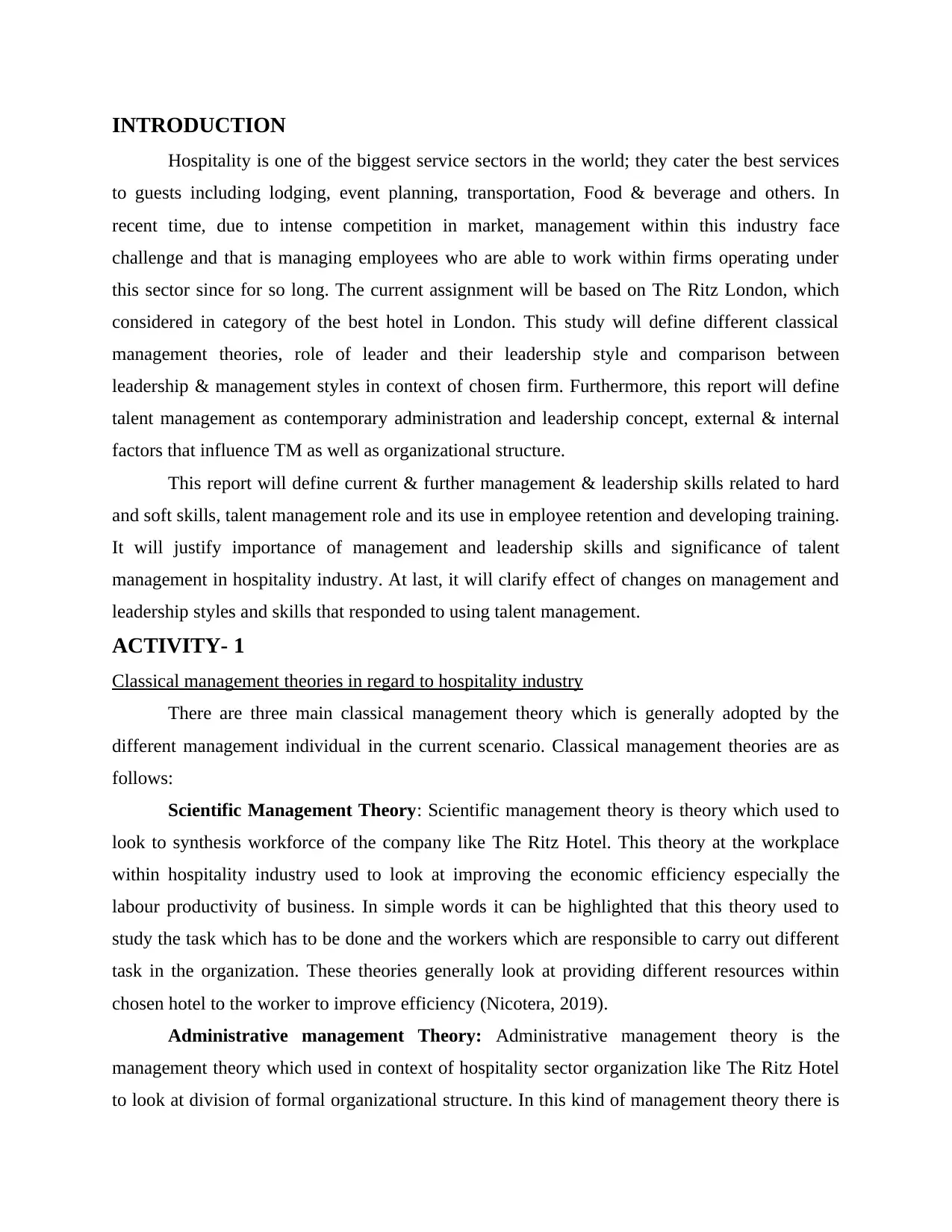
INTRODUCTION
Hospitality is one of the biggest service sectors in the world; they cater the best services
to guests including lodging, event planning, transportation, Food & beverage and others. In
recent time, due to intense competition in market, management within this industry face
challenge and that is managing employees who are able to work within firms operating under
this sector since for so long. The current assignment will be based on The Ritz London, which
considered in category of the best hotel in London. This study will define different classical
management theories, role of leader and their leadership style and comparison between
leadership & management styles in context of chosen firm. Furthermore, this report will define
talent management as contemporary administration and leadership concept, external & internal
factors that influence TM as well as organizational structure.
This report will define current & further management & leadership skills related to hard
and soft skills, talent management role and its use in employee retention and developing training.
It will justify importance of management and leadership skills and significance of talent
management in hospitality industry. At last, it will clarify effect of changes on management and
leadership styles and skills that responded to using talent management.
ACTIVITY- 1
Classical management theories in regard to hospitality industry
There are three main classical management theory which is generally adopted by the
different management individual in the current scenario. Classical management theories are as
follows:
Scientific Management Theory: Scientific management theory is theory which used to
look to synthesis workforce of the company like The Ritz Hotel. This theory at the workplace
within hospitality industry used to look at improving the economic efficiency especially the
labour productivity of business. In simple words it can be highlighted that this theory used to
study the task which has to be done and the workers which are responsible to carry out different
task in the organization. These theories generally look at providing different resources within
chosen hotel to the worker to improve efficiency (Nicotera, 2019).
Administrative management Theory: Administrative management theory is the
management theory which used in context of hospitality sector organization like The Ritz Hotel
to look at division of formal organizational structure. In this kind of management theory there is
Hospitality is one of the biggest service sectors in the world; they cater the best services
to guests including lodging, event planning, transportation, Food & beverage and others. In
recent time, due to intense competition in market, management within this industry face
challenge and that is managing employees who are able to work within firms operating under
this sector since for so long. The current assignment will be based on The Ritz London, which
considered in category of the best hotel in London. This study will define different classical
management theories, role of leader and their leadership style and comparison between
leadership & management styles in context of chosen firm. Furthermore, this report will define
talent management as contemporary administration and leadership concept, external & internal
factors that influence TM as well as organizational structure.
This report will define current & further management & leadership skills related to hard
and soft skills, talent management role and its use in employee retention and developing training.
It will justify importance of management and leadership skills and significance of talent
management in hospitality industry. At last, it will clarify effect of changes on management and
leadership styles and skills that responded to using talent management.
ACTIVITY- 1
Classical management theories in regard to hospitality industry
There are three main classical management theory which is generally adopted by the
different management individual in the current scenario. Classical management theories are as
follows:
Scientific Management Theory: Scientific management theory is theory which used to
look to synthesis workforce of the company like The Ritz Hotel. This theory at the workplace
within hospitality industry used to look at improving the economic efficiency especially the
labour productivity of business. In simple words it can be highlighted that this theory used to
study the task which has to be done and the workers which are responsible to carry out different
task in the organization. These theories generally look at providing different resources within
chosen hotel to the worker to improve efficiency (Nicotera, 2019).
Administrative management Theory: Administrative management theory is the
management theory which used in context of hospitality sector organization like The Ritz Hotel
to look at division of formal organizational structure. In this kind of management theory there is
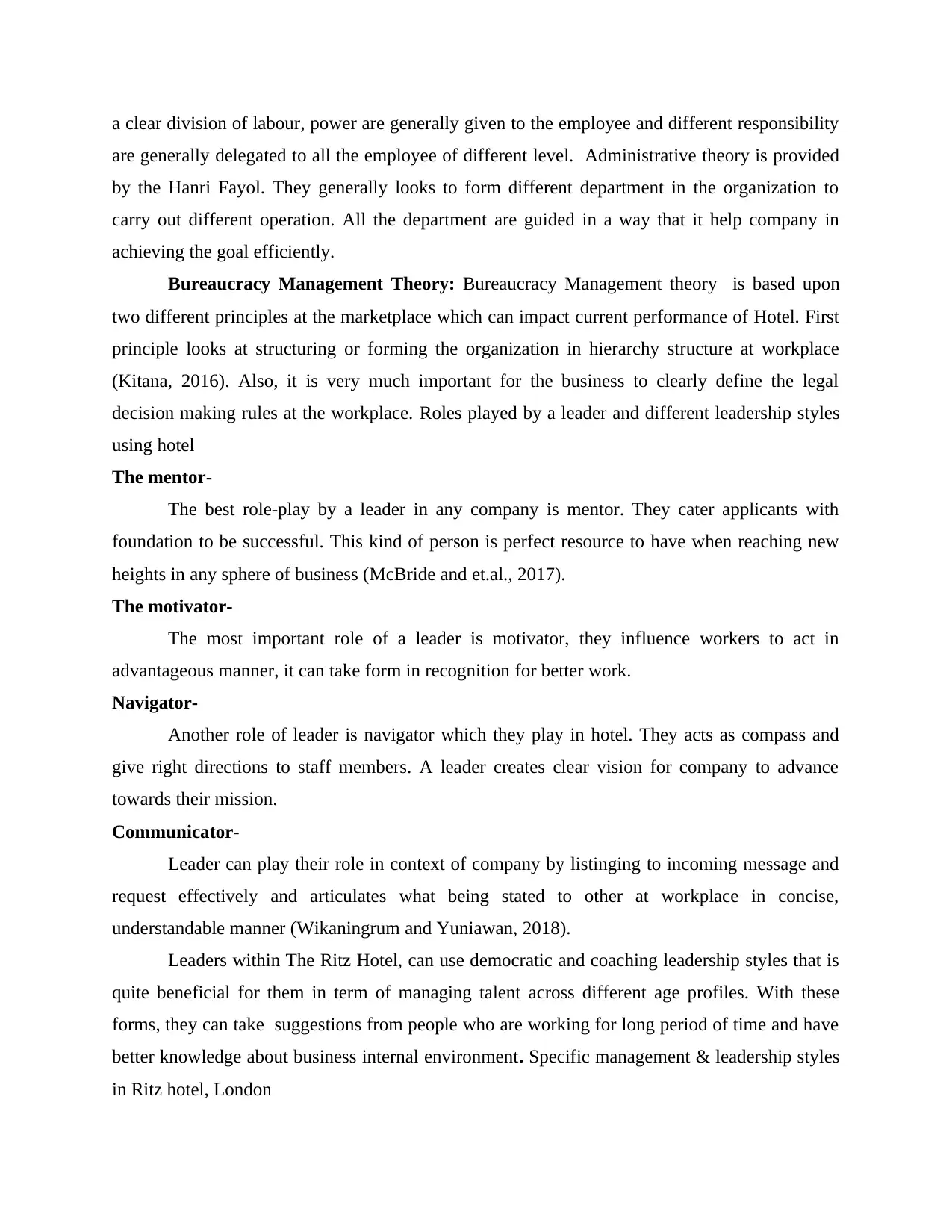
a clear division of labour, power are generally given to the employee and different responsibility
are generally delegated to all the employee of different level. Administrative theory is provided
by the Hanri Fayol. They generally looks to form different department in the organization to
carry out different operation. All the department are guided in a way that it help company in
achieving the goal efficiently.
Bureaucracy Management Theory: Bureaucracy Management theory is based upon
two different principles at the marketplace which can impact current performance of Hotel. First
principle looks at structuring or forming the organization in hierarchy structure at workplace
(Kitana, 2016). Also, it is very much important for the business to clearly define the legal
decision making rules at the workplace. Roles played by a leader and different leadership styles
using hotel
The mentor-
The best role-play by a leader in any company is mentor. They cater applicants with
foundation to be successful. This kind of person is perfect resource to have when reaching new
heights in any sphere of business (McBride and et.al., 2017).
The motivator-
The most important role of a leader is motivator, they influence workers to act in
advantageous manner, it can take form in recognition for better work.
Navigator-
Another role of leader is navigator which they play in hotel. They acts as compass and
give right directions to staff members. A leader creates clear vision for company to advance
towards their mission.
Communicator-
Leader can play their role in context of company by listinging to incoming message and
request effectively and articulates what being stated to other at workplace in concise,
understandable manner (Wikaningrum and Yuniawan, 2018).
Leaders within The Ritz Hotel, can use democratic and coaching leadership styles that is
quite beneficial for them in term of managing talent across different age profiles. With these
forms, they can take suggestions from people who are working for long period of time and have
better knowledge about business internal environment. Specific management & leadership styles
in Ritz hotel, London
are generally delegated to all the employee of different level. Administrative theory is provided
by the Hanri Fayol. They generally looks to form different department in the organization to
carry out different operation. All the department are guided in a way that it help company in
achieving the goal efficiently.
Bureaucracy Management Theory: Bureaucracy Management theory is based upon
two different principles at the marketplace which can impact current performance of Hotel. First
principle looks at structuring or forming the organization in hierarchy structure at workplace
(Kitana, 2016). Also, it is very much important for the business to clearly define the legal
decision making rules at the workplace. Roles played by a leader and different leadership styles
using hotel
The mentor-
The best role-play by a leader in any company is mentor. They cater applicants with
foundation to be successful. This kind of person is perfect resource to have when reaching new
heights in any sphere of business (McBride and et.al., 2017).
The motivator-
The most important role of a leader is motivator, they influence workers to act in
advantageous manner, it can take form in recognition for better work.
Navigator-
Another role of leader is navigator which they play in hotel. They acts as compass and
give right directions to staff members. A leader creates clear vision for company to advance
towards their mission.
Communicator-
Leader can play their role in context of company by listinging to incoming message and
request effectively and articulates what being stated to other at workplace in concise,
understandable manner (Wikaningrum and Yuniawan, 2018).
Leaders within The Ritz Hotel, can use democratic and coaching leadership styles that is
quite beneficial for them in term of managing talent across different age profiles. With these
forms, they can take suggestions from people who are working for long period of time and have
better knowledge about business internal environment. Specific management & leadership styles
in Ritz hotel, London
Secure Best Marks with AI Grader
Need help grading? Try our AI Grader for instant feedback on your assignments.
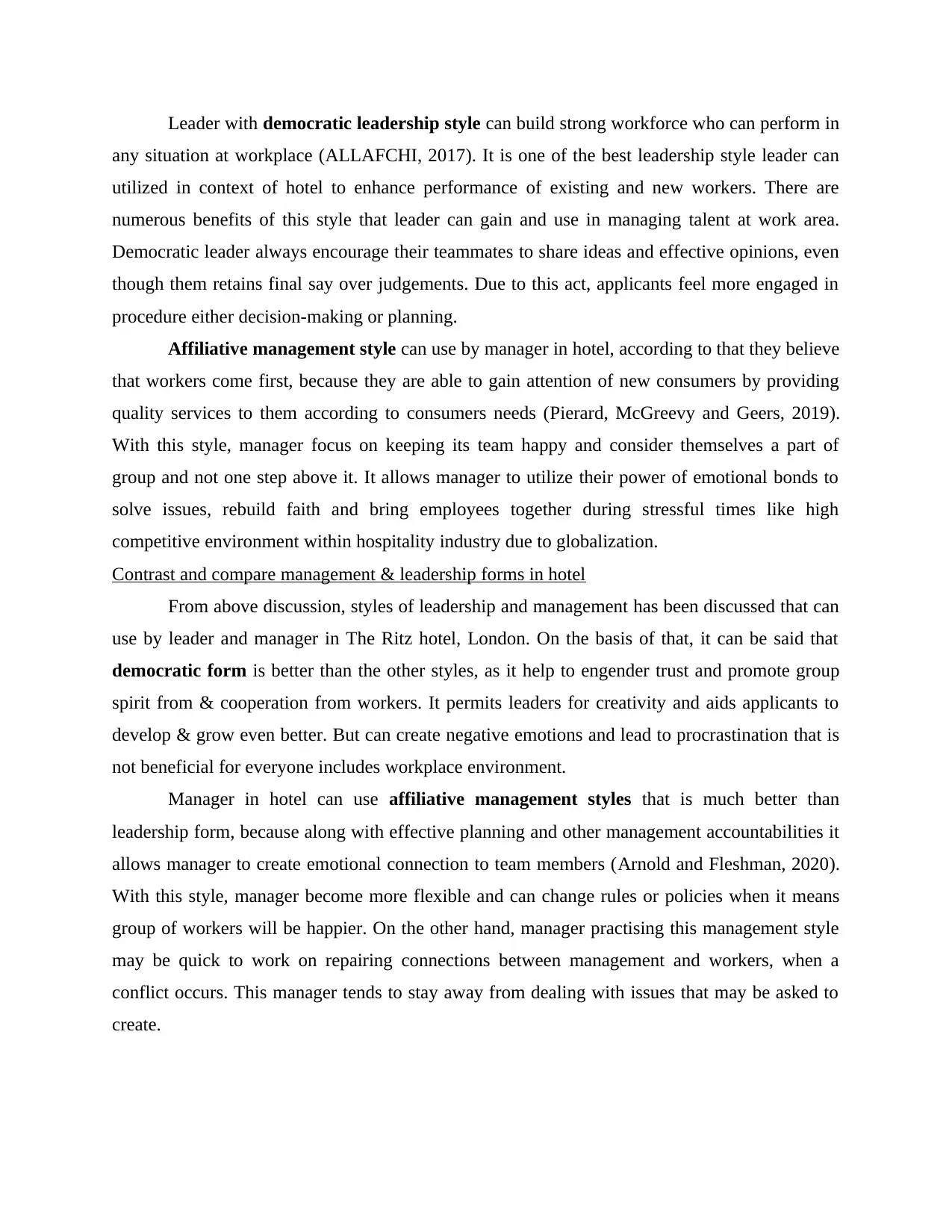
Leader with democratic leadership style can build strong workforce who can perform in
any situation at workplace (ALLAFCHI, 2017). It is one of the best leadership style leader can
utilized in context of hotel to enhance performance of existing and new workers. There are
numerous benefits of this style that leader can gain and use in managing talent at work area.
Democratic leader always encourage their teammates to share ideas and effective opinions, even
though them retains final say over judgements. Due to this act, applicants feel more engaged in
procedure either decision-making or planning.
Affiliative management style can use by manager in hotel, according to that they believe
that workers come first, because they are able to gain attention of new consumers by providing
quality services to them according to consumers needs (Pierard, McGreevy and Geers, 2019).
With this style, manager focus on keeping its team happy and consider themselves a part of
group and not one step above it. It allows manager to utilize their power of emotional bonds to
solve issues, rebuild faith and bring employees together during stressful times like high
competitive environment within hospitality industry due to globalization.
Contrast and compare management & leadership forms in hotel
From above discussion, styles of leadership and management has been discussed that can
use by leader and manager in The Ritz hotel, London. On the basis of that, it can be said that
democratic form is better than the other styles, as it help to engender trust and promote group
spirit from & cooperation from workers. It permits leaders for creativity and aids applicants to
develop & grow even better. But can create negative emotions and lead to procrastination that is
not beneficial for everyone includes workplace environment.
Manager in hotel can use affiliative management styles that is much better than
leadership form, because along with effective planning and other management accountabilities it
allows manager to create emotional connection to team members (Arnold and Fleshman, 2020).
With this style, manager become more flexible and can change rules or policies when it means
group of workers will be happier. On the other hand, manager practising this management style
may be quick to work on repairing connections between management and workers, when a
conflict occurs. This manager tends to stay away from dealing with issues that may be asked to
create.
any situation at workplace (ALLAFCHI, 2017). It is one of the best leadership style leader can
utilized in context of hotel to enhance performance of existing and new workers. There are
numerous benefits of this style that leader can gain and use in managing talent at work area.
Democratic leader always encourage their teammates to share ideas and effective opinions, even
though them retains final say over judgements. Due to this act, applicants feel more engaged in
procedure either decision-making or planning.
Affiliative management style can use by manager in hotel, according to that they believe
that workers come first, because they are able to gain attention of new consumers by providing
quality services to them according to consumers needs (Pierard, McGreevy and Geers, 2019).
With this style, manager focus on keeping its team happy and consider themselves a part of
group and not one step above it. It allows manager to utilize their power of emotional bonds to
solve issues, rebuild faith and bring employees together during stressful times like high
competitive environment within hospitality industry due to globalization.
Contrast and compare management & leadership forms in hotel
From above discussion, styles of leadership and management has been discussed that can
use by leader and manager in The Ritz hotel, London. On the basis of that, it can be said that
democratic form is better than the other styles, as it help to engender trust and promote group
spirit from & cooperation from workers. It permits leaders for creativity and aids applicants to
develop & grow even better. But can create negative emotions and lead to procrastination that is
not beneficial for everyone includes workplace environment.
Manager in hotel can use affiliative management styles that is much better than
leadership form, because along with effective planning and other management accountabilities it
allows manager to create emotional connection to team members (Arnold and Fleshman, 2020).
With this style, manager become more flexible and can change rules or policies when it means
group of workers will be happier. On the other hand, manager practising this management style
may be quick to work on repairing connections between management and workers, when a
conflict occurs. This manager tends to stay away from dealing with issues that may be asked to
create.
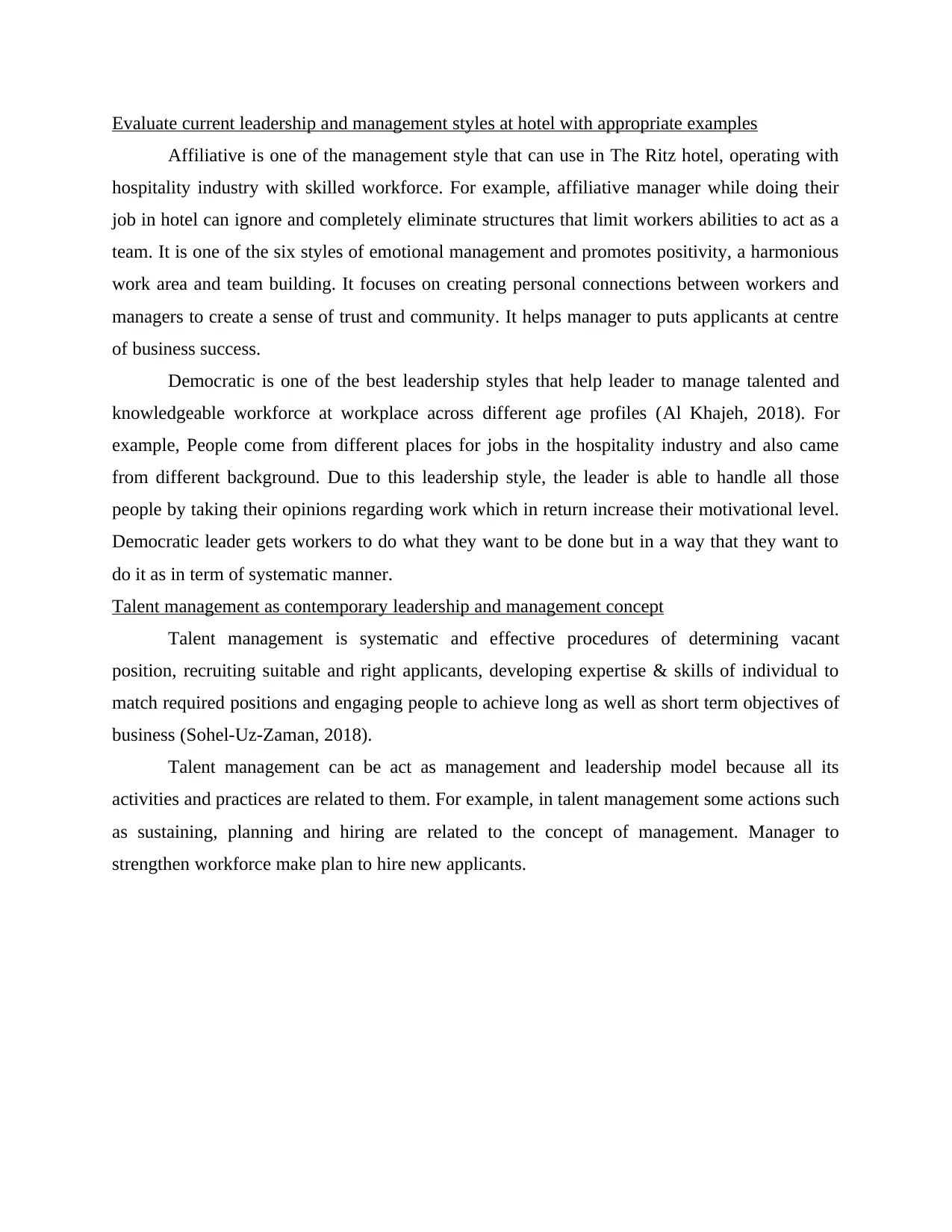
Evaluate current leadership and management styles at hotel with appropriate examples
Affiliative is one of the management style that can use in The Ritz hotel, operating with
hospitality industry with skilled workforce. For example, affiliative manager while doing their
job in hotel can ignore and completely eliminate structures that limit workers abilities to act as a
team. It is one of the six styles of emotional management and promotes positivity, a harmonious
work area and team building. It focuses on creating personal connections between workers and
managers to create a sense of trust and community. It helps manager to puts applicants at centre
of business success.
Democratic is one of the best leadership styles that help leader to manage talented and
knowledgeable workforce at workplace across different age profiles (Al Khajeh, 2018). For
example, People come from different places for jobs in the hospitality industry and also came
from different background. Due to this leadership style, the leader is able to handle all those
people by taking their opinions regarding work which in return increase their motivational level.
Democratic leader gets workers to do what they want to be done but in a way that they want to
do it as in term of systematic manner.
Talent management as contemporary leadership and management concept
Talent management is systematic and effective procedures of determining vacant
position, recruiting suitable and right applicants, developing expertise & skills of individual to
match required positions and engaging people to achieve long as well as short term objectives of
business (Sohel-Uz-Zaman, 2018).
Talent management can be act as management and leadership model because all its
activities and practices are related to them. For example, in talent management some actions such
as sustaining, planning and hiring are related to the concept of management. Manager to
strengthen workforce make plan to hire new applicants.
Affiliative is one of the management style that can use in The Ritz hotel, operating with
hospitality industry with skilled workforce. For example, affiliative manager while doing their
job in hotel can ignore and completely eliminate structures that limit workers abilities to act as a
team. It is one of the six styles of emotional management and promotes positivity, a harmonious
work area and team building. It focuses on creating personal connections between workers and
managers to create a sense of trust and community. It helps manager to puts applicants at centre
of business success.
Democratic is one of the best leadership styles that help leader to manage talented and
knowledgeable workforce at workplace across different age profiles (Al Khajeh, 2018). For
example, People come from different places for jobs in the hospitality industry and also came
from different background. Due to this leadership style, the leader is able to handle all those
people by taking their opinions regarding work which in return increase their motivational level.
Democratic leader gets workers to do what they want to be done but in a way that they want to
do it as in term of systematic manner.
Talent management as contemporary leadership and management concept
Talent management is systematic and effective procedures of determining vacant
position, recruiting suitable and right applicants, developing expertise & skills of individual to
match required positions and engaging people to achieve long as well as short term objectives of
business (Sohel-Uz-Zaman, 2018).
Talent management can be act as management and leadership model because all its
activities and practices are related to them. For example, in talent management some actions such
as sustaining, planning and hiring are related to the concept of management. Manager to
strengthen workforce make plan to hire new applicants.
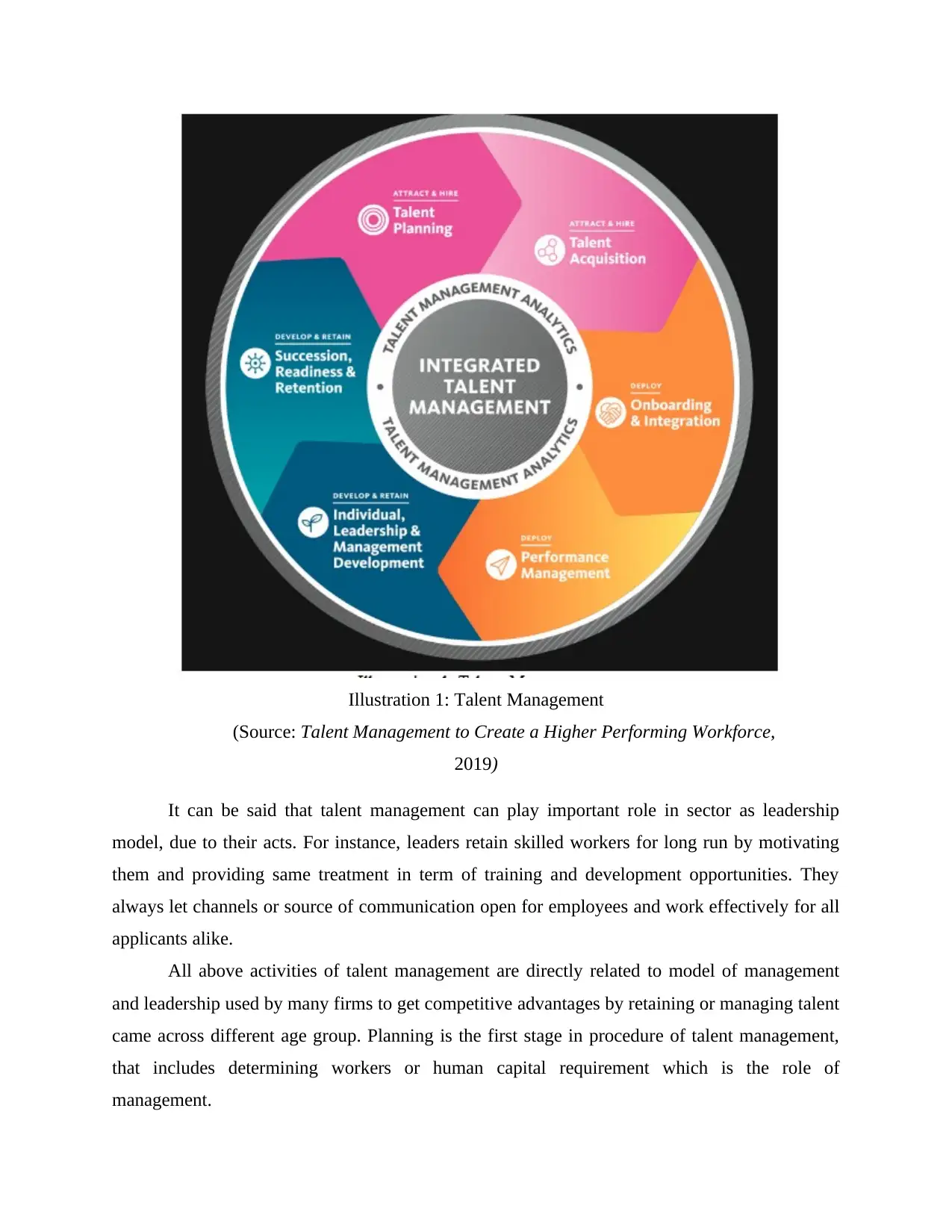
It can be said that talent management can play important role in sector as leadership
model, due to their acts. For instance, leaders retain skilled workers for long run by motivating
them and providing same treatment in term of training and development opportunities. They
always let channels or source of communication open for employees and work effectively for all
applicants alike.
All above activities of talent management are directly related to model of management
and leadership used by many firms to get competitive advantages by retaining or managing talent
came across different age group. Planning is the first stage in procedure of talent management,
that includes determining workers or human capital requirement which is the role of
management.
Illustration 1: Talent Management
(Source: Talent Management to Create a Higher Performing Workforce,
2019)
model, due to their acts. For instance, leaders retain skilled workers for long run by motivating
them and providing same treatment in term of training and development opportunities. They
always let channels or source of communication open for employees and work effectively for all
applicants alike.
All above activities of talent management are directly related to model of management
and leadership used by many firms to get competitive advantages by retaining or managing talent
came across different age group. Planning is the first stage in procedure of talent management,
that includes determining workers or human capital requirement which is the role of
management.
Illustration 1: Talent Management
(Source: Talent Management to Create a Higher Performing Workforce,
2019)
Paraphrase This Document
Need a fresh take? Get an instant paraphrase of this document with our AI Paraphraser
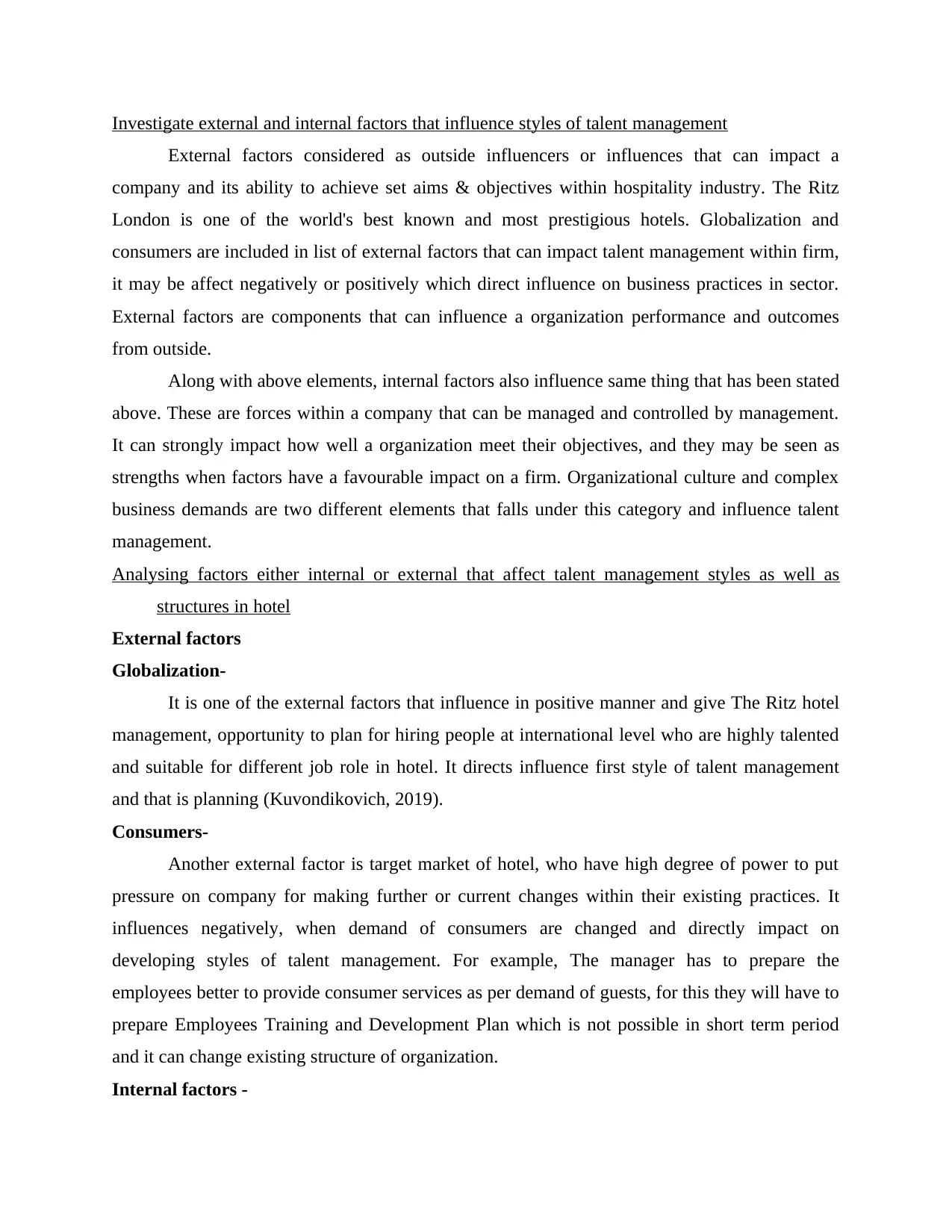
Investigate external and internal factors that influence styles of talent management
External factors considered as outside influencers or influences that can impact a
company and its ability to achieve set aims & objectives within hospitality industry. The Ritz
London is one of the world's best known and most prestigious hotels. Globalization and
consumers are included in list of external factors that can impact talent management within firm,
it may be affect negatively or positively which direct influence on business practices in sector.
External factors are components that can influence a organization performance and outcomes
from outside.
Along with above elements, internal factors also influence same thing that has been stated
above. These are forces within a company that can be managed and controlled by management.
It can strongly impact how well a organization meet their objectives, and they may be seen as
strengths when factors have a favourable impact on a firm. Organizational culture and complex
business demands are two different elements that falls under this category and influence talent
management.
Analysing factors either internal or external that affect talent management styles as well as
structures in hotel
External factors
Globalization-
It is one of the external factors that influence in positive manner and give The Ritz hotel
management, opportunity to plan for hiring people at international level who are highly talented
and suitable for different job role in hotel. It directs influence first style of talent management
and that is planning (Kuvondikovich, 2019).
Consumers-
Another external factor is target market of hotel, who have high degree of power to put
pressure on company for making further or current changes within their existing practices. It
influences negatively, when demand of consumers are changed and directly impact on
developing styles of talent management. For example, The manager has to prepare the
employees better to provide consumer services as per demand of guests, for this they will have to
prepare Employees Training and Development Plan which is not possible in short term period
and it can change existing structure of organization.
Internal factors -
External factors considered as outside influencers or influences that can impact a
company and its ability to achieve set aims & objectives within hospitality industry. The Ritz
London is one of the world's best known and most prestigious hotels. Globalization and
consumers are included in list of external factors that can impact talent management within firm,
it may be affect negatively or positively which direct influence on business practices in sector.
External factors are components that can influence a organization performance and outcomes
from outside.
Along with above elements, internal factors also influence same thing that has been stated
above. These are forces within a company that can be managed and controlled by management.
It can strongly impact how well a organization meet their objectives, and they may be seen as
strengths when factors have a favourable impact on a firm. Organizational culture and complex
business demands are two different elements that falls under this category and influence talent
management.
Analysing factors either internal or external that affect talent management styles as well as
structures in hotel
External factors
Globalization-
It is one of the external factors that influence in positive manner and give The Ritz hotel
management, opportunity to plan for hiring people at international level who are highly talented
and suitable for different job role in hotel. It directs influence first style of talent management
and that is planning (Kuvondikovich, 2019).
Consumers-
Another external factor is target market of hotel, who have high degree of power to put
pressure on company for making further or current changes within their existing practices. It
influences negatively, when demand of consumers are changed and directly impact on
developing styles of talent management. For example, The manager has to prepare the
employees better to provide consumer services as per demand of guests, for this they will have to
prepare Employees Training and Development Plan which is not possible in short term period
and it can change existing structure of organization.
Internal factors -
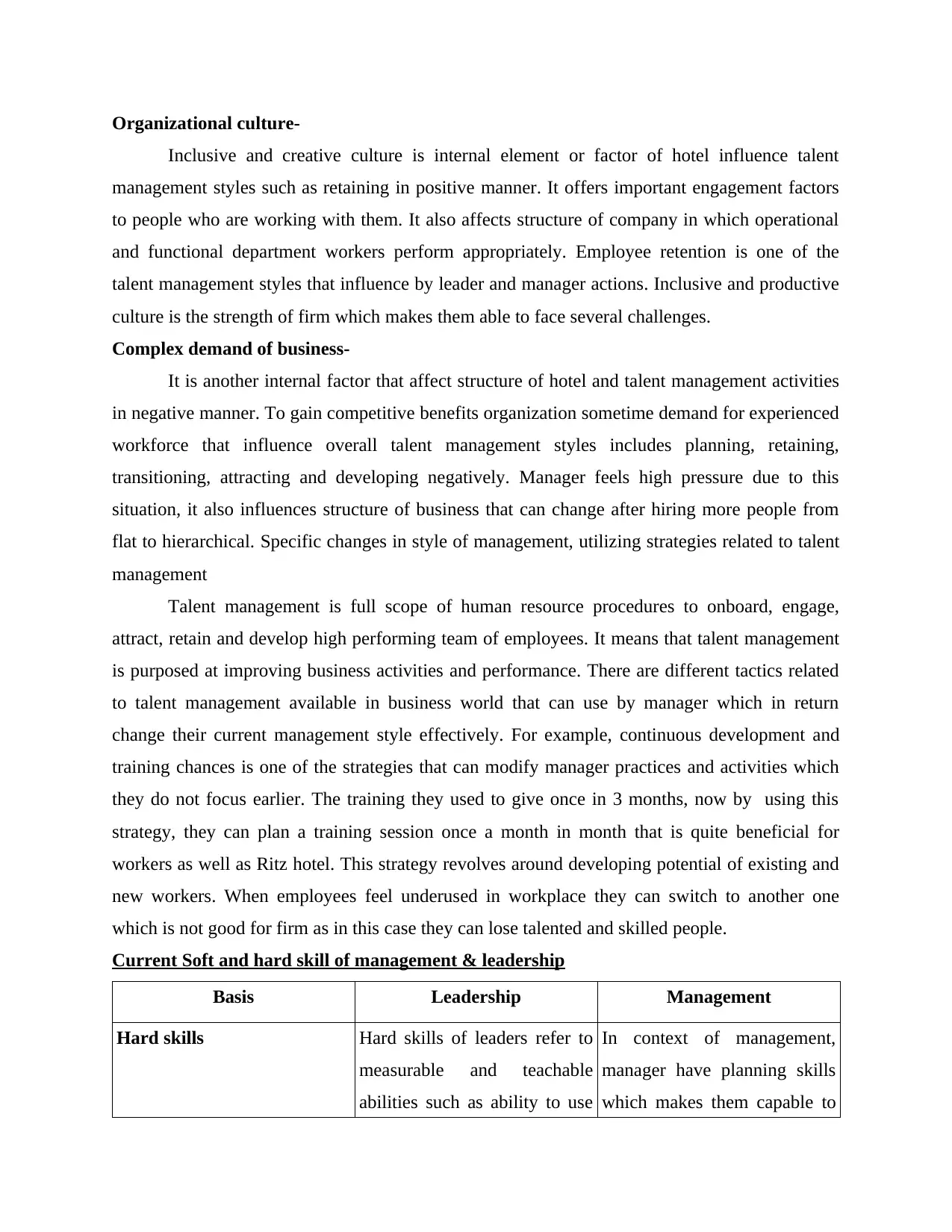
Organizational culture-
Inclusive and creative culture is internal element or factor of hotel influence talent
management styles such as retaining in positive manner. It offers important engagement factors
to people who are working with them. It also affects structure of company in which operational
and functional department workers perform appropriately. Employee retention is one of the
talent management styles that influence by leader and manager actions. Inclusive and productive
culture is the strength of firm which makes them able to face several challenges.
Complex demand of business-
It is another internal factor that affect structure of hotel and talent management activities
in negative manner. To gain competitive benefits organization sometime demand for experienced
workforce that influence overall talent management styles includes planning, retaining,
transitioning, attracting and developing negatively. Manager feels high pressure due to this
situation, it also influences structure of business that can change after hiring more people from
flat to hierarchical. Specific changes in style of management, utilizing strategies related to talent
management
Talent management is full scope of human resource procedures to onboard, engage,
attract, retain and develop high performing team of employees. It means that talent management
is purposed at improving business activities and performance. There are different tactics related
to talent management available in business world that can use by manager which in return
change their current management style effectively. For example, continuous development and
training chances is one of the strategies that can modify manager practices and activities which
they do not focus earlier. The training they used to give once in 3 months, now by using this
strategy, they can plan a training session once a month in month that is quite beneficial for
workers as well as Ritz hotel. This strategy revolves around developing potential of existing and
new workers. When employees feel underused in workplace they can switch to another one
which is not good for firm as in this case they can lose talented and skilled people.
Current Soft and hard skill of management & leadership
Basis Leadership Management
Hard skills Hard skills of leaders refer to
measurable and teachable
abilities such as ability to use
In context of management,
manager have planning skills
which makes them capable to
Inclusive and creative culture is internal element or factor of hotel influence talent
management styles such as retaining in positive manner. It offers important engagement factors
to people who are working with them. It also affects structure of company in which operational
and functional department workers perform appropriately. Employee retention is one of the
talent management styles that influence by leader and manager actions. Inclusive and productive
culture is the strength of firm which makes them able to face several challenges.
Complex demand of business-
It is another internal factor that affect structure of hotel and talent management activities
in negative manner. To gain competitive benefits organization sometime demand for experienced
workforce that influence overall talent management styles includes planning, retaining,
transitioning, attracting and developing negatively. Manager feels high pressure due to this
situation, it also influences structure of business that can change after hiring more people from
flat to hierarchical. Specific changes in style of management, utilizing strategies related to talent
management
Talent management is full scope of human resource procedures to onboard, engage,
attract, retain and develop high performing team of employees. It means that talent management
is purposed at improving business activities and performance. There are different tactics related
to talent management available in business world that can use by manager which in return
change their current management style effectively. For example, continuous development and
training chances is one of the strategies that can modify manager practices and activities which
they do not focus earlier. The training they used to give once in 3 months, now by using this
strategy, they can plan a training session once a month in month that is quite beneficial for
workers as well as Ritz hotel. This strategy revolves around developing potential of existing and
new workers. When employees feel underused in workplace they can switch to another one
which is not good for firm as in this case they can lose talented and skilled people.
Current Soft and hard skill of management & leadership
Basis Leadership Management
Hard skills Hard skills of leaders refer to
measurable and teachable
abilities such as ability to use
In context of management,
manager have planning skills
which makes them capable to
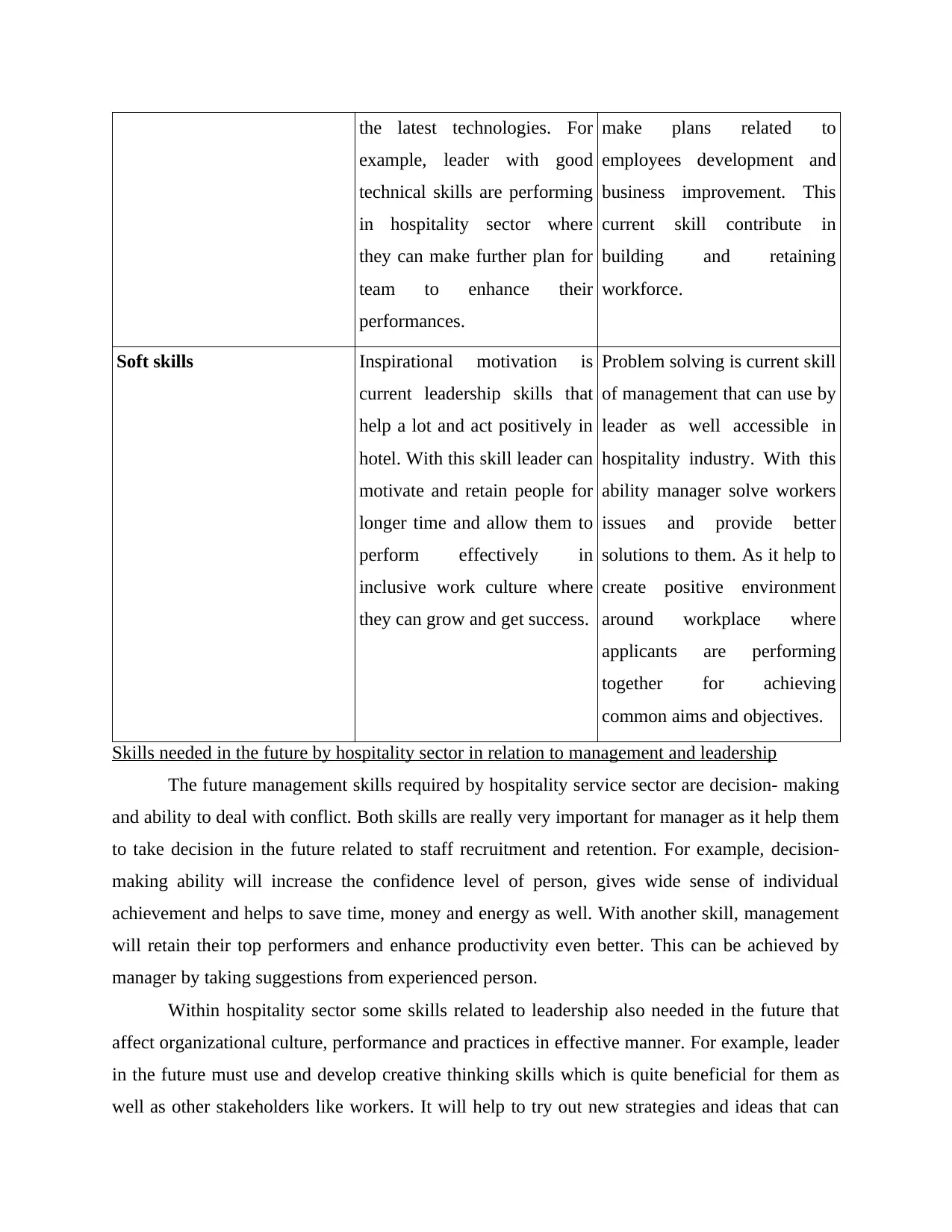
the latest technologies. For
example, leader with good
technical skills are performing
in hospitality sector where
they can make further plan for
team to enhance their
performances.
make plans related to
employees development and
business improvement. This
current skill contribute in
building and retaining
workforce.
Soft skills Inspirational motivation is
current leadership skills that
help a lot and act positively in
hotel. With this skill leader can
motivate and retain people for
longer time and allow them to
perform effectively in
inclusive work culture where
they can grow and get success.
Problem solving is current skill
of management that can use by
leader as well accessible in
hospitality industry. With this
ability manager solve workers
issues and provide better
solutions to them. As it help to
create positive environment
around workplace where
applicants are performing
together for achieving
common aims and objectives.
Skills needed in the future by hospitality sector in relation to management and leadership
The future management skills required by hospitality service sector are decision- making
and ability to deal with conflict. Both skills are really very important for manager as it help them
to take decision in the future related to staff recruitment and retention. For example, decision-
making ability will increase the confidence level of person, gives wide sense of individual
achievement and helps to save time, money and energy as well. With another skill, management
will retain their top performers and enhance productivity even better. This can be achieved by
manager by taking suggestions from experienced person.
Within hospitality sector some skills related to leadership also needed in the future that
affect organizational culture, performance and practices in effective manner. For example, leader
in the future must use and develop creative thinking skills which is quite beneficial for them as
well as other stakeholders like workers. It will help to try out new strategies and ideas that can
example, leader with good
technical skills are performing
in hospitality sector where
they can make further plan for
team to enhance their
performances.
make plans related to
employees development and
business improvement. This
current skill contribute in
building and retaining
workforce.
Soft skills Inspirational motivation is
current leadership skills that
help a lot and act positively in
hotel. With this skill leader can
motivate and retain people for
longer time and allow them to
perform effectively in
inclusive work culture where
they can grow and get success.
Problem solving is current skill
of management that can use by
leader as well accessible in
hospitality industry. With this
ability manager solve workers
issues and provide better
solutions to them. As it help to
create positive environment
around workplace where
applicants are performing
together for achieving
common aims and objectives.
Skills needed in the future by hospitality sector in relation to management and leadership
The future management skills required by hospitality service sector are decision- making
and ability to deal with conflict. Both skills are really very important for manager as it help them
to take decision in the future related to staff recruitment and retention. For example, decision-
making ability will increase the confidence level of person, gives wide sense of individual
achievement and helps to save time, money and energy as well. With another skill, management
will retain their top performers and enhance productivity even better. This can be achieved by
manager by taking suggestions from experienced person.
Within hospitality sector some skills related to leadership also needed in the future that
affect organizational culture, performance and practices in effective manner. For example, leader
in the future must use and develop creative thinking skills which is quite beneficial for them as
well as other stakeholders like workers. It will help to try out new strategies and ideas that can
Secure Best Marks with AI Grader
Need help grading? Try our AI Grader for instant feedback on your assignments.
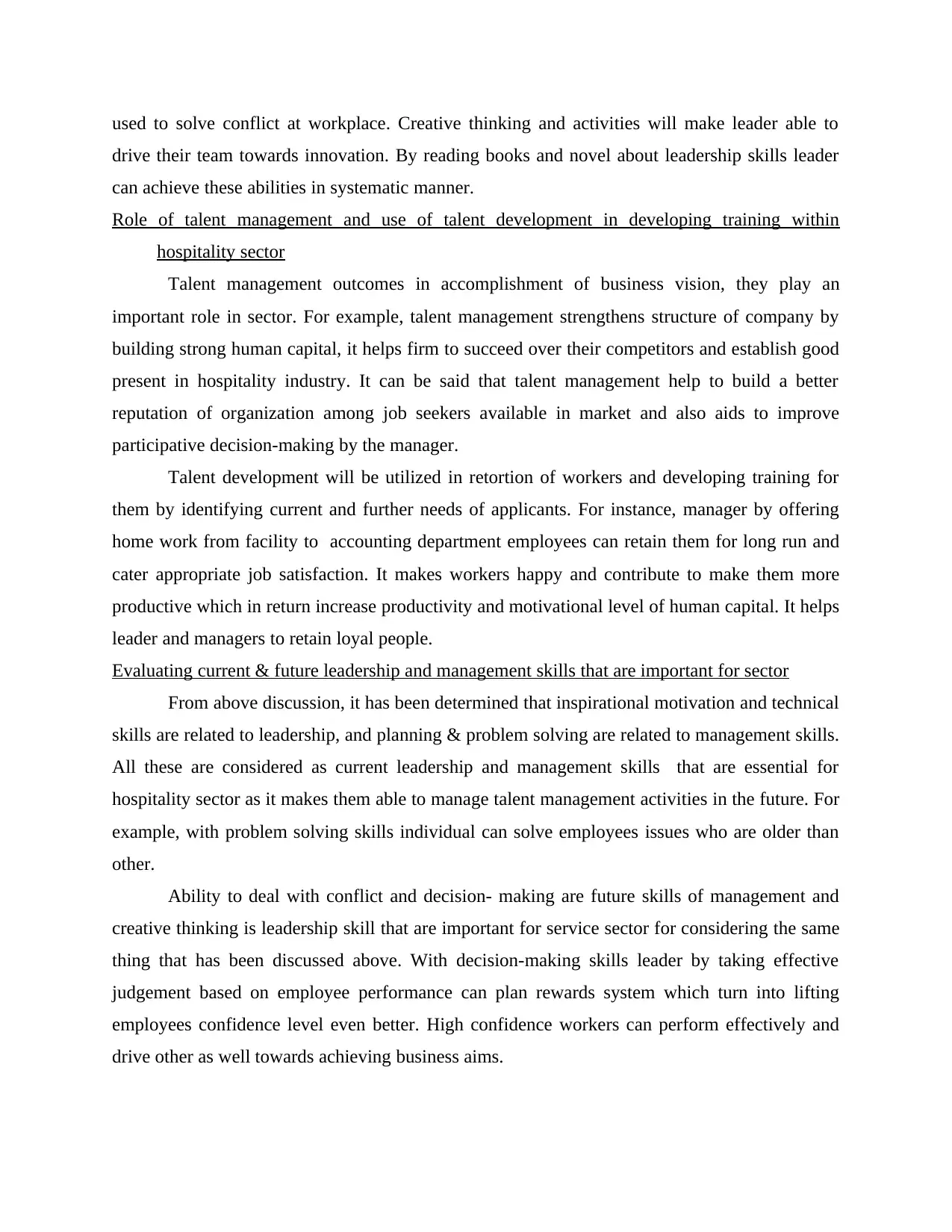
used to solve conflict at workplace. Creative thinking and activities will make leader able to
drive their team towards innovation. By reading books and novel about leadership skills leader
can achieve these abilities in systematic manner.
Role of talent management and use of talent development in developing training within
hospitality sector
Talent management outcomes in accomplishment of business vision, they play an
important role in sector. For example, talent management strengthens structure of company by
building strong human capital, it helps firm to succeed over their competitors and establish good
present in hospitality industry. It can be said that talent management help to build a better
reputation of organization among job seekers available in market and also aids to improve
participative decision-making by the manager.
Talent development will be utilized in retortion of workers and developing training for
them by identifying current and further needs of applicants. For instance, manager by offering
home work from facility to accounting department employees can retain them for long run and
cater appropriate job satisfaction. It makes workers happy and contribute to make them more
productive which in return increase productivity and motivational level of human capital. It helps
leader and managers to retain loyal people.
Evaluating current & future leadership and management skills that are important for sector
From above discussion, it has been determined that inspirational motivation and technical
skills are related to leadership, and planning & problem solving are related to management skills.
All these are considered as current leadership and management skills that are essential for
hospitality sector as it makes them able to manage talent management activities in the future. For
example, with problem solving skills individual can solve employees issues who are older than
other.
Ability to deal with conflict and decision- making are future skills of management and
creative thinking is leadership skill that are important for service sector for considering the same
thing that has been discussed above. With decision-making skills leader by taking effective
judgement based on employee performance can plan rewards system which turn into lifting
employees confidence level even better. High confidence workers can perform effectively and
drive other as well towards achieving business aims.
drive their team towards innovation. By reading books and novel about leadership skills leader
can achieve these abilities in systematic manner.
Role of talent management and use of talent development in developing training within
hospitality sector
Talent management outcomes in accomplishment of business vision, they play an
important role in sector. For example, talent management strengthens structure of company by
building strong human capital, it helps firm to succeed over their competitors and establish good
present in hospitality industry. It can be said that talent management help to build a better
reputation of organization among job seekers available in market and also aids to improve
participative decision-making by the manager.
Talent development will be utilized in retortion of workers and developing training for
them by identifying current and further needs of applicants. For instance, manager by offering
home work from facility to accounting department employees can retain them for long run and
cater appropriate job satisfaction. It makes workers happy and contribute to make them more
productive which in return increase productivity and motivational level of human capital. It helps
leader and managers to retain loyal people.
Evaluating current & future leadership and management skills that are important for sector
From above discussion, it has been determined that inspirational motivation and technical
skills are related to leadership, and planning & problem solving are related to management skills.
All these are considered as current leadership and management skills that are essential for
hospitality sector as it makes them able to manage talent management activities in the future. For
example, with problem solving skills individual can solve employees issues who are older than
other.
Ability to deal with conflict and decision- making are future skills of management and
creative thinking is leadership skill that are important for service sector for considering the same
thing that has been discussed above. With decision-making skills leader by taking effective
judgement based on employee performance can plan rewards system which turn into lifting
employees confidence level even better. High confidence workers can perform effectively and
drive other as well towards achieving business aims.
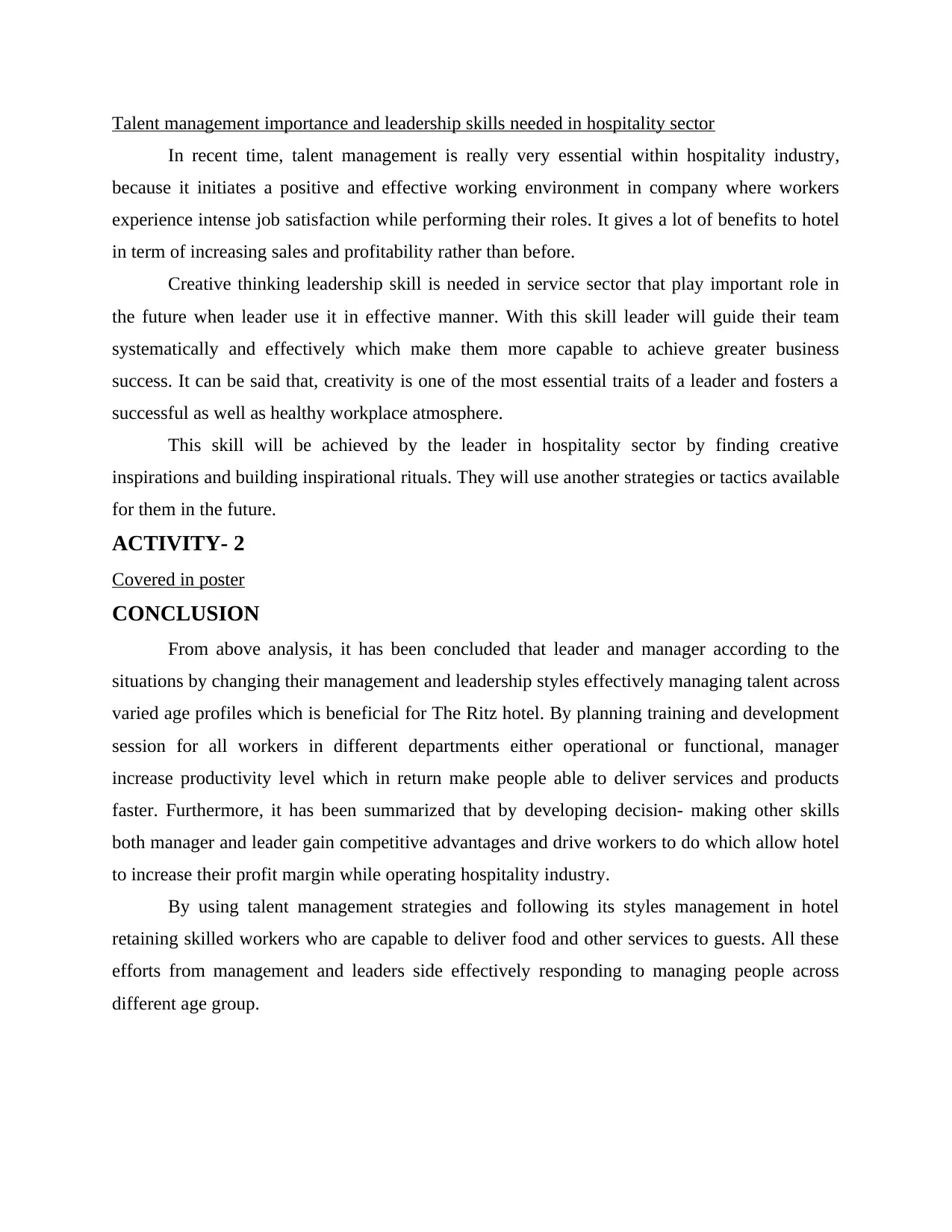
Talent management importance and leadership skills needed in hospitality sector
In recent time, talent management is really very essential within hospitality industry,
because it initiates a positive and effective working environment in company where workers
experience intense job satisfaction while performing their roles. It gives a lot of benefits to hotel
in term of increasing sales and profitability rather than before.
Creative thinking leadership skill is needed in service sector that play important role in
the future when leader use it in effective manner. With this skill leader will guide their team
systematically and effectively which make them more capable to achieve greater business
success. It can be said that, creativity is one of the most essential traits of a leader and fosters a
successful as well as healthy workplace atmosphere.
This skill will be achieved by the leader in hospitality sector by finding creative
inspirations and building inspirational rituals. They will use another strategies or tactics available
for them in the future.
ACTIVITY- 2
Covered in poster
CONCLUSION
From above analysis, it has been concluded that leader and manager according to the
situations by changing their management and leadership styles effectively managing talent across
varied age profiles which is beneficial for The Ritz hotel. By planning training and development
session for all workers in different departments either operational or functional, manager
increase productivity level which in return make people able to deliver services and products
faster. Furthermore, it has been summarized that by developing decision- making other skills
both manager and leader gain competitive advantages and drive workers to do which allow hotel
to increase their profit margin while operating hospitality industry.
By using talent management strategies and following its styles management in hotel
retaining skilled workers who are capable to deliver food and other services to guests. All these
efforts from management and leaders side effectively responding to managing people across
different age group.
In recent time, talent management is really very essential within hospitality industry,
because it initiates a positive and effective working environment in company where workers
experience intense job satisfaction while performing their roles. It gives a lot of benefits to hotel
in term of increasing sales and profitability rather than before.
Creative thinking leadership skill is needed in service sector that play important role in
the future when leader use it in effective manner. With this skill leader will guide their team
systematically and effectively which make them more capable to achieve greater business
success. It can be said that, creativity is one of the most essential traits of a leader and fosters a
successful as well as healthy workplace atmosphere.
This skill will be achieved by the leader in hospitality sector by finding creative
inspirations and building inspirational rituals. They will use another strategies or tactics available
for them in the future.
ACTIVITY- 2
Covered in poster
CONCLUSION
From above analysis, it has been concluded that leader and manager according to the
situations by changing their management and leadership styles effectively managing talent across
varied age profiles which is beneficial for The Ritz hotel. By planning training and development
session for all workers in different departments either operational or functional, manager
increase productivity level which in return make people able to deliver services and products
faster. Furthermore, it has been summarized that by developing decision- making other skills
both manager and leader gain competitive advantages and drive workers to do which allow hotel
to increase their profit margin while operating hospitality industry.
By using talent management strategies and following its styles management in hotel
retaining skilled workers who are capable to deliver food and other services to guests. All these
efforts from management and leaders side effectively responding to managing people across
different age group.
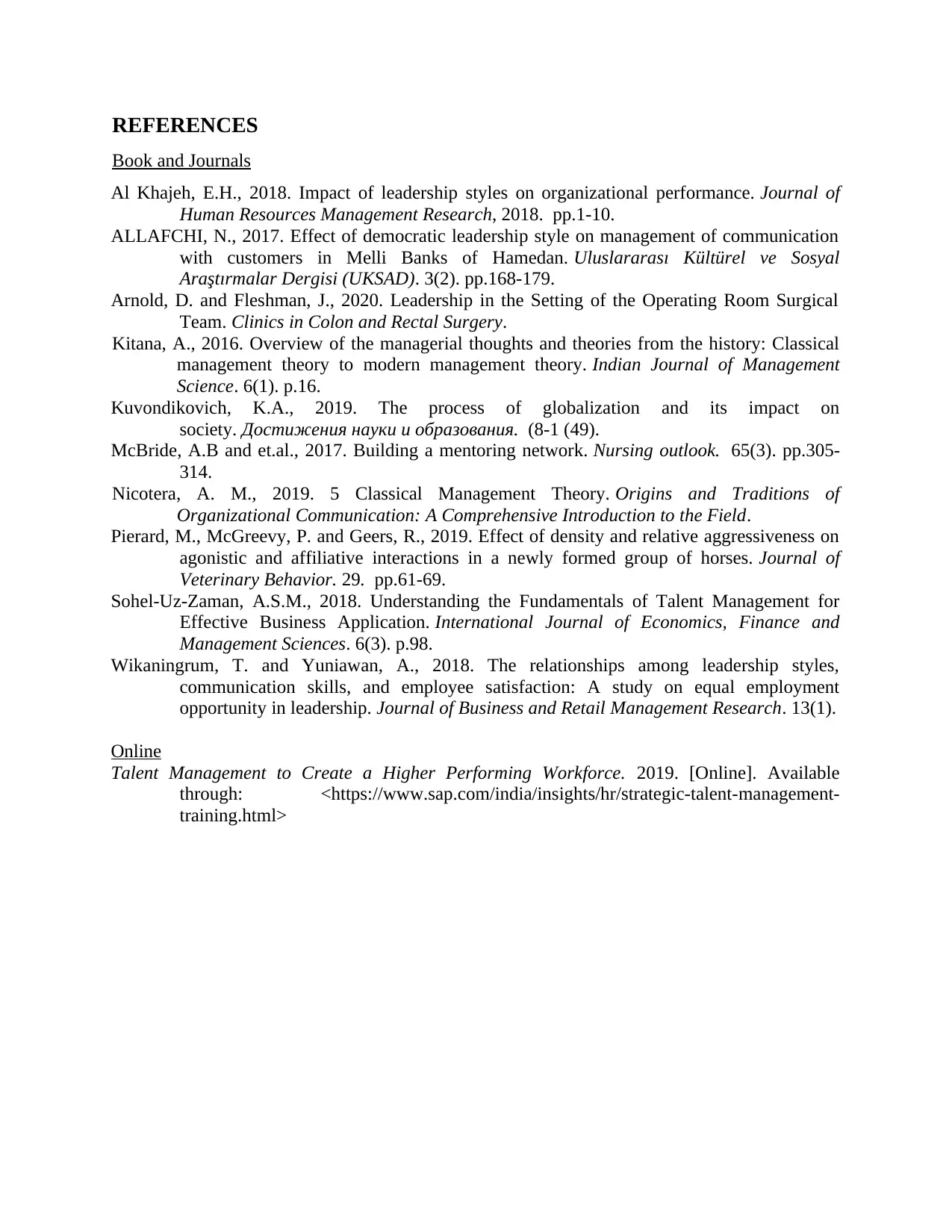
REFERENCES
Book and Journals
Al Khajeh, E.H., 2018. Impact of leadership styles on organizational performance. Journal of
Human Resources Management Research, 2018. pp.1-10.
ALLAFCHI, N., 2017. Effect of democratic leadership style on management of communication
with customers in Melli Banks of Hamedan. Uluslararası Kültürel ve Sosyal
Araştırmalar Dergisi (UKSAD). 3(2). pp.168-179.
Arnold, D. and Fleshman, J., 2020. Leadership in the Setting of the Operating Room Surgical
Team. Clinics in Colon and Rectal Surgery.
Kitana, A., 2016. Overview of the managerial thoughts and theories from the history: Classical
management theory to modern management theory. Indian Journal of Management
Science. 6(1). p.16.
Kuvondikovich, K.A., 2019. The process of globalization and its impact on
society. Достижения науки и образования. (8-1 (49).
McBride, A.B and et.al., 2017. Building a mentoring network. Nursing outlook. 65(3). pp.305-
314.
Nicotera, A. M., 2019. 5 Classical Management Theory. Origins and Traditions of
Organizational Communication: A Comprehensive Introduction to the Field.
Pierard, M., McGreevy, P. and Geers, R., 2019. Effect of density and relative aggressiveness on
agonistic and affiliative interactions in a newly formed group of horses. Journal of
Veterinary Behavior. 29. pp.61-69.
Sohel-Uz-Zaman, A.S.M., 2018. Understanding the Fundamentals of Talent Management for
Effective Business Application. International Journal of Economics, Finance and
Management Sciences. 6(3). p.98.
Wikaningrum, T. and Yuniawan, A., 2018. The relationships among leadership styles,
communication skills, and employee satisfaction: A study on equal employment
opportunity in leadership. Journal of Business and Retail Management Research. 13(1).
Online
Talent Management to Create a Higher Performing Workforce. 2019. [Online]. Available
through: <https://www.sap.com/india/insights/hr/strategic-talent-management-
training.html>
Book and Journals
Al Khajeh, E.H., 2018. Impact of leadership styles on organizational performance. Journal of
Human Resources Management Research, 2018. pp.1-10.
ALLAFCHI, N., 2017. Effect of democratic leadership style on management of communication
with customers in Melli Banks of Hamedan. Uluslararası Kültürel ve Sosyal
Araştırmalar Dergisi (UKSAD). 3(2). pp.168-179.
Arnold, D. and Fleshman, J., 2020. Leadership in the Setting of the Operating Room Surgical
Team. Clinics in Colon and Rectal Surgery.
Kitana, A., 2016. Overview of the managerial thoughts and theories from the history: Classical
management theory to modern management theory. Indian Journal of Management
Science. 6(1). p.16.
Kuvondikovich, K.A., 2019. The process of globalization and its impact on
society. Достижения науки и образования. (8-1 (49).
McBride, A.B and et.al., 2017. Building a mentoring network. Nursing outlook. 65(3). pp.305-
314.
Nicotera, A. M., 2019. 5 Classical Management Theory. Origins and Traditions of
Organizational Communication: A Comprehensive Introduction to the Field.
Pierard, M., McGreevy, P. and Geers, R., 2019. Effect of density and relative aggressiveness on
agonistic and affiliative interactions in a newly formed group of horses. Journal of
Veterinary Behavior. 29. pp.61-69.
Sohel-Uz-Zaman, A.S.M., 2018. Understanding the Fundamentals of Talent Management for
Effective Business Application. International Journal of Economics, Finance and
Management Sciences. 6(3). p.98.
Wikaningrum, T. and Yuniawan, A., 2018. The relationships among leadership styles,
communication skills, and employee satisfaction: A study on equal employment
opportunity in leadership. Journal of Business and Retail Management Research. 13(1).
Online
Talent Management to Create a Higher Performing Workforce. 2019. [Online]. Available
through: <https://www.sap.com/india/insights/hr/strategic-talent-management-
training.html>
1 out of 13
Related Documents
Your All-in-One AI-Powered Toolkit for Academic Success.
+13062052269
info@desklib.com
Available 24*7 on WhatsApp / Email
![[object Object]](/_next/static/media/star-bottom.7253800d.svg)
Unlock your academic potential
© 2024 | Zucol Services PVT LTD | All rights reserved.




